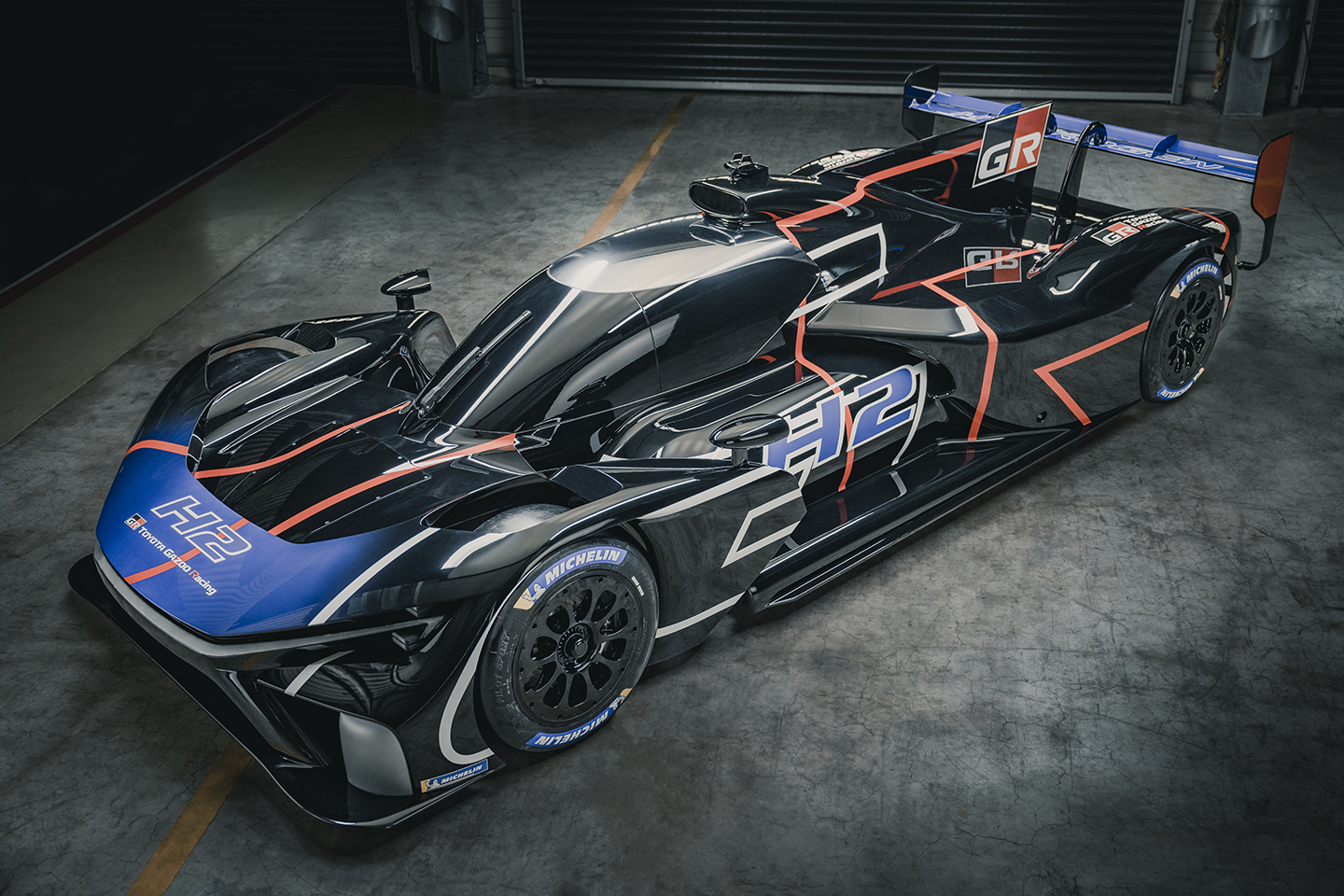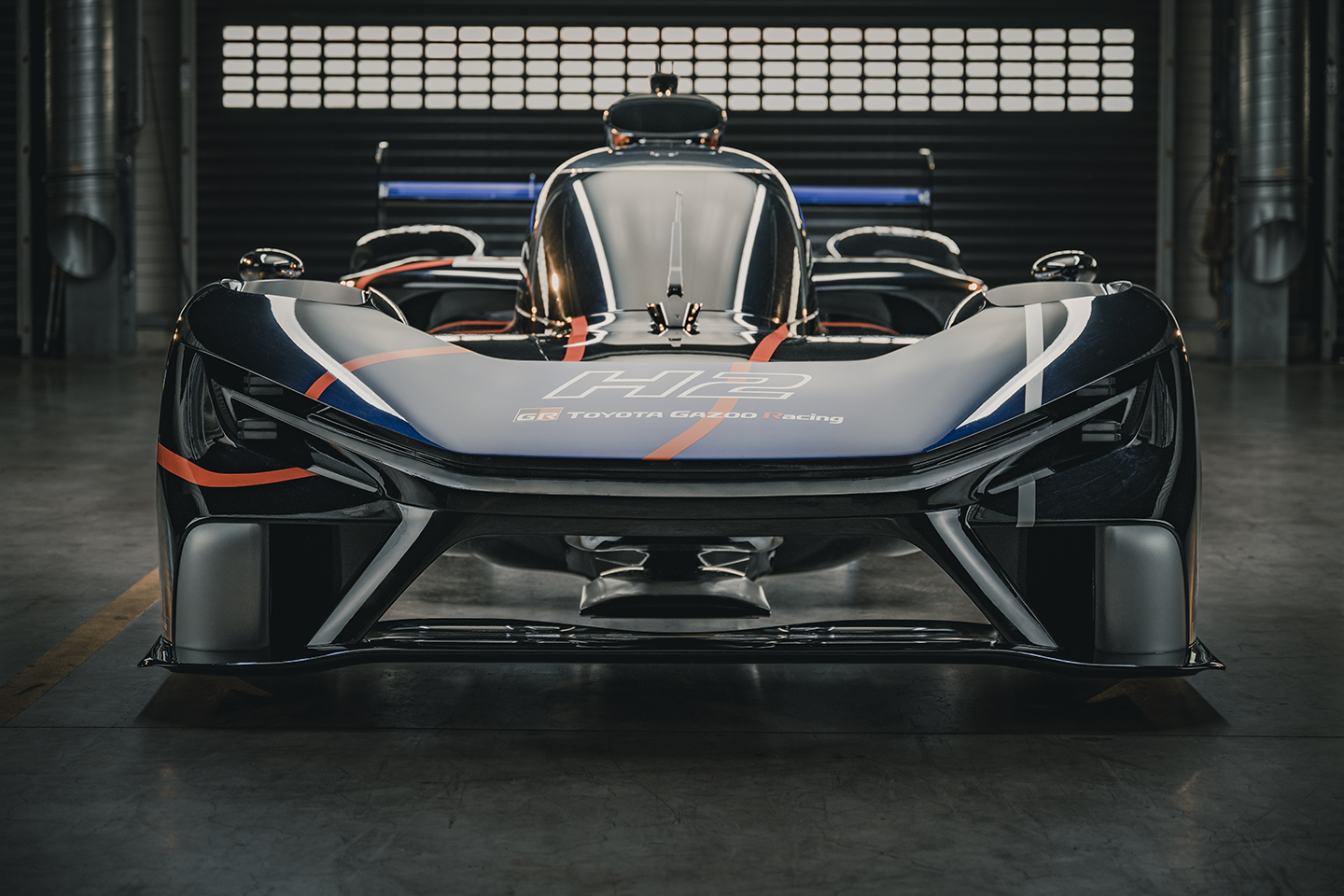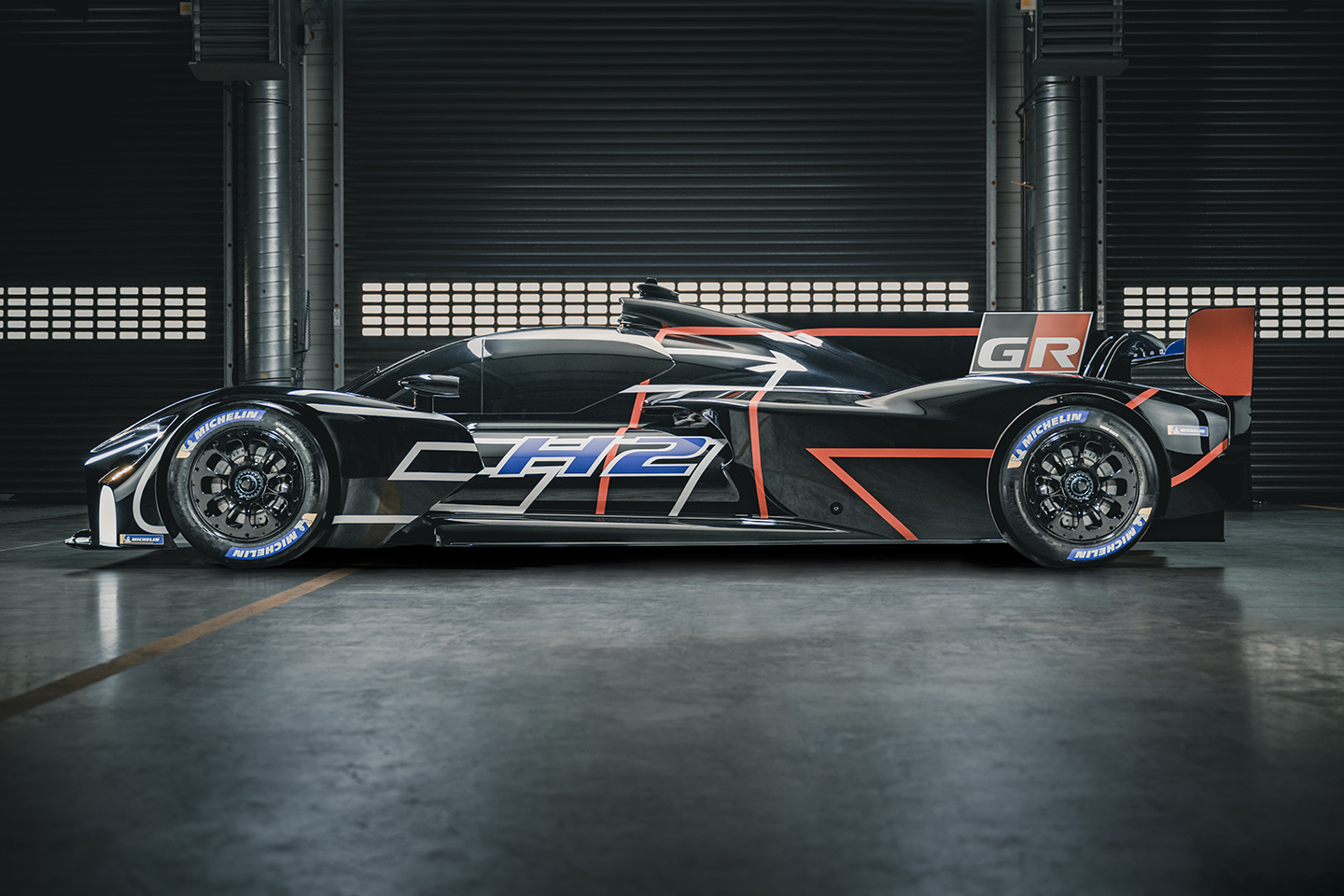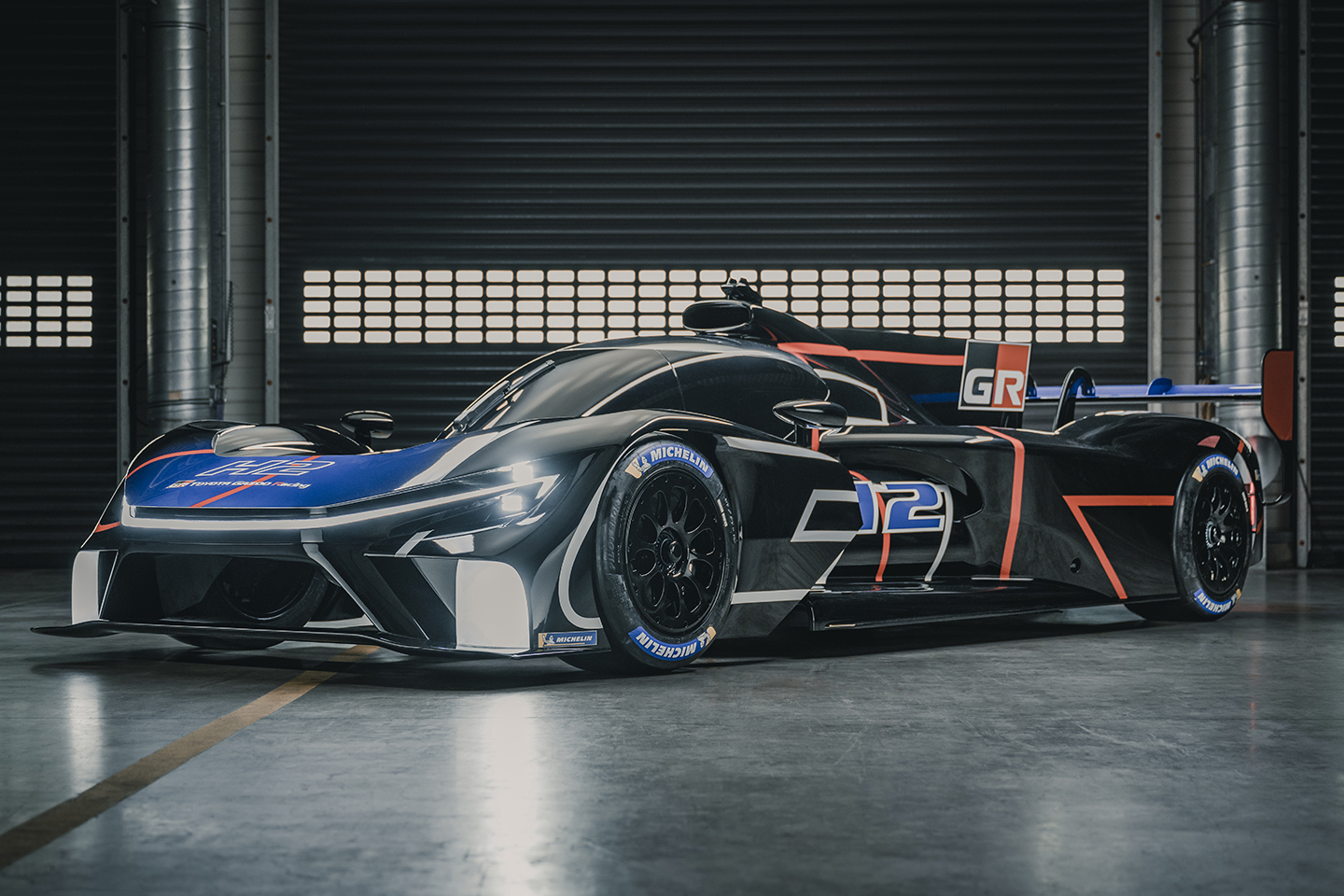Toyota Gazoo Racing reveals hydrogen concept
A hydrogen-powered Toyota will be at Le Mans by 2026 - and look something like the GR H2

Nobody could accuse Toyota of lacking commitment when it comes to using hydrogen to power cars. The Mirai is one of very, very few commercially available fuel cell electric vehicles, and the manufacturer has also shown what’s possible using hydrogen as a fuel for conventional engines. Since 2021 it has been racing a Corolla in Super Taikyu that’s hydrogen fuelled, and that car finished the Fuji 24 Hours earlier this year. Additionally, it’s taken the time to show that both the GR Yaris triple and Lexus 5.0 V8 can run on H2. So when the ACO said that hydrogen racers - either fuelled by it, or powering a fuel cell - could enter from 2026, you knew Toyota would be first out of the blocks with a preview.
This is the GR H2 Racing Concept which, well, looks a lot like a Toyota prototype racer. It’s low, long and sleek, the driver sits in a canopy and aero is clearly the name of the game. All sounds very obvious, of course, but then very little has actually been said so far about the GR. Toyota has confirmed the hydrogen engine and hybrid system, that it’s 5.1m long and 2.05m wide and, er, that’s it. The press release doesn’t even have anything interesting from Akio Toyoda, often so dependable when it comes to useful insight or enthusiasm. On the centenary of Le Mans, he expressed ‘his gratitude’ to the ACO ‘for the opportunity to hone cars through the race’. Yawn.
We’ve really got to look to the future, then. Following the introduction of a hydrogen class in 2026, the ACO expects all racers to be using it as fuel by 2030. The manufacturers will be encouraged to do so before then through - you’ve guessed it - Balance of Performance, which would mean that an H2 car could win outright before the decade is out. So no wonder Toyota is keen to show what it can do. Having enjoyed so much success in the hybrid era - a TS050 won Le Mans in 2018, 2019 and 2020, a GR010 in ’21 and ’22 - Toyota will understandably want to repeat those triumphs as the sportscar formula evolves further. And if it can bolster the hydrogen road car cause, then all the better.
Because that’s the end game, really. Toyota has been vocal in its multi-faceted approach to a carbon-neutral world (or as close to it as is possible), with hydrogen one of the avenues it’s pursuing to reduce emissions. A successful motorsport campaign could help convince the wider world of hydrogen’s viability going forward; prove it can fuel an exciting racing car and be replenished without too much kerfuffle and half the battle is won, surely. Or at least it suggests a. viable alternative to the battery-electric alternative. And if nothing else, the GR H2 Racing Concept, along with everything else Toyota is doing in motorsport, demonstrates that a top-tier hydrogen competition car isn’t far away. Given Toyota’s recent form in racing, that’s a prospect to be very excited about.



And then we wait EV-loonies.
Appreciate that there is a lot of noise out there regarding Green H2, but it's a fallacy for the personal motorcar, a net-loss in energy vs. just putting the same electricity into a battery car.
It's easy to see where the naivety can creep in.
While It's exciting to see engineers imagine H2 powertrains in various one-off vehicles, we've been round the houses on this topic a number of times.
As engineers and industry types on PH have noted in other threads, there are fundamental obstacles, fundamental laws of physics, that would render personal-transport-based H2, whether fuel cells or internal combustion, a veritable Brabazon meets W. Heath Robinson.
While It's exciting to see engineers imagine H2 powertrains in various one-off vehicles, we've been round the houses on this topic a number of times.
As engineers and industry types on PH have noted in other threads, there are fundamental obstacles, fundamental laws of physics, that would render personal-transport-based H2, whether fuel cells or internal combustion, a veritable Brabazon meets W. Heath Robinson.
TX.
TX.
While It's exciting to see engineers imagine H2 powertrains in various one-off vehicles, we've been round the houses on this topic a number of times.
As engineers and industry types on PH have noted in other threads, there are fundamental obstacles, fundamental laws of physics, that would render personal-transport-based H2, whether fuel cells or internal combustion, a veritable Brabazon meets W. Heath Robinson.
TX.
And think better next time!
And think better next time!
For the manufacturers racing is marketing. That's what this car is and if and when it races it will no doubt steal the show regardless how it does. That's why they're doing it. By all means support it, I will be because it's cool, but I'll be staggered if it ever leads to a meaningful HICE/HFC offering.
TX.
It’s not exclusive to the Japanese either, years ago in my old job I worked on a novel ICE tech project for a major German OEM that cost them millions but the basic cost/complexity against benefit made it so obviously pointless from virtually the outset that no sane person would ever believe it would make it past basic simulation. It made it all the way to running prototype because it was one relatively small legacy department spending their sizeable budget to justify their existence.
Fuel cells may well have useful applications in heavier vehicles in the future but not in typical cars or motorsport and hydrogen ICE just is not useful and probably never will be.
And think better next time!
Might wanna take your own advice.
1. F1 racing doesn’t require huge volumes of fuels so the infinitesimally small volumes of these fuels that will be available now and in the future are ok.
2. F1 is a spectacle not transport so needs sound
3. F1 doesn’t have a tailpipe emissions ban like road cars do so they can continue to burn things whereas e-fuels are part of certainly the U.K. ban (new cars)
4. Energy required to run a full race is not compatible with the volumetric energy density of current battery technology
5. All of the above are the reason why e-fuels work for racing but not road
Having said all of that most of the emissions in F1 come from logistics, manufacture, air travel etc so it’s super irrelevant to lower the race car CO2. Their series technical guy Pat Fry confessed it was only 0.7% of their total footprint. They should carry on with petrol but it doesn’t have the same greenwashing potential so there you go. With transport and logistics of the synth fuel from the green hydro production locale it likely ends up dirtier
Gassing Station | General Gassing | Top of Page | What's New | My Stuff




